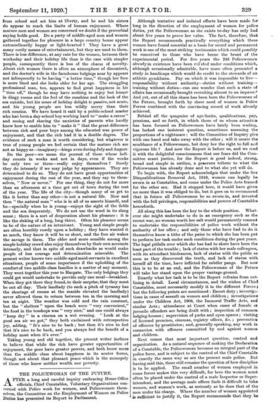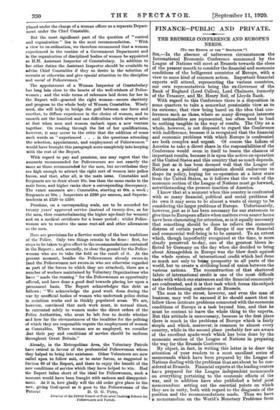THE POLICEWOMAN OF THE FUTURE.
AFTER a long and careful inquiry embracing Home Office officials, Chief Constables, Voluntary Organizations con- cerned with Police work for women, and Policewomen them- selves, the Committee on the Employment of Women on Police Duties has presented its Report to Parliament.
Although tentative and isolated efforts have been made for long in the direction of the employment of women for police duties, yet the Policewoman as she exists to-day has only had about five years to prove her value. The fact, therefore, that the Report recommends practically everything which these women have found essential as a basis for sound and permanent work is one of the most striking testimonies which could possibly be conceived to those who have borne the brunt of the experimental period. For five years the 248 Policewomen already in existence have been enrsted under conditions which, although occasionally admirable, have more often presented a study in handicaps which would do credit to the stewards of an
athletic gymkhana. Pay on which it was impossible to live—
responsibility without authority—duties without training— training without duties—can one wonder that such a state of affairs has occasionally brought recruiting almost to an impasse? And yet, out of all this chaos has been born the Policewoman of the Future, brought forth by sheer need of women in Police Forces combined with the convincing record of work already achieved.
Behind all the quagmire of age-limits, qualifications, pay. pensions, and so forth, in which those of us whose attention has been focused on Policewomen have lately been wading, has lurked one insistent question, sometimes assuming the proportions of a nightmare : will the Committee of Inquiry give with one hand and take away with the other ; will it create the semblance of a Policewoman, but deny her the right to full and vigorous life ? And now the Report is before us, and we read it with the delightful consciousness that our fears did the Com- mittee scant justice, for the Report is good indeed, strong. broad and simple in outline, a generous tribute to what the Policewoman has already done and to what she yet will do.
To begin with, the Report acknowledges that under the Sex Disqualifications Removal Act, 1919, women can legally be sworn in as Constables, and come under the Police Acts framed for the other sex. Had it stopped here, it would have given no more than it was obliged to do, but it goes on to recommend that in future all Policewomen be so sworn-in, and invested with the full privileges, responsibilities and powers of Constables henceforth.
All along this has been the key to the whole position. What- ever she might undertake to do in an emergency such as the recent war, no woman worth her salt would permanently consent to undertake the responsibilities of police work without the authority of her office ; and only those who have had to do it themselves know a tithe of the pains to which she has been put to perform her task under such conditions during the past years. The legal pitfalls over which she has had to skate have been the least part of the trouble ; lack of status with her male colleagues, with its attendant hindrances, lack of status with the public so soon as they discovered the truth, and lack of status with herself all the time, have inflicted far subtler pangs. But now this is to be at an end, and the Policewoman of the Future will take her stand upon the proper vantage-ground.
Exactly what her task is to be the Report refrains from out- lining in detail. Local circumstances, and the wishes of Chic!
Constables, must necessarily modify it in the different Forces ; but the following points are mentioned : Escort duty ; investiga- tions in cases of assault on women and children ; investigations under the Children Act, 1908, the Immoral Traffic Acts, and similar Acts ; attendance at Court when cases of female of juvenile offenders are being dealt with ; inspection of common lodging-houses ; supervision of parks and open spaces ; visiting of licensed premises, cinemas, registry offices, &c. ; prevention of offences by prostitutes; and, generally speaking, any work in connexion with offences committed by and against -a omen and children.
Next comes that most important question, control and organization. As a natural sequence of making the Declaration of a Constable, the Policewoman becomes an integral part of the police force, and is subject to the control of the Chief Constable in exactly the same way as are the present male police. But having said this, there still remains the question of how discipline is to be applied. The small number of women employed in some forces makes this very difficult, for here the women must often be placed under the control of a male Inspector or Super- intendent, and the average male officer finds it difficult to take women, and women's work, as seriously as he does that of the men under his charge. Where the number of women appointed is sufficient to justify it, the Report recommends that they be placed under the charge of a woman officer as a separate Depart- ment under the Chief Constable.
But the most significant part of the question of " control and organization " lies in the next recommendation. " With a view to co-ordination, we therefore recommend that a woman experienced in the routine of a Government Department and in the organization of disciplined bodies of women be appointed as H.M. Assistant Inspector of Constabulary. In addition to her other duties the Assistant Inspector should be available to advise Chief Constables if they so desire in the selection of recruits or otherwise and give special attention to the discipline and moral of Policewomen."
The appointment of a Woman Inspector of Constabulary has long lain close to the hearts of the well-wishers of Police- women ; and the wide terms of reference laid down for her in the Report will-ranted the right woman—secure elasticity and progress to the whole body of Women Constables. Wisely used, she will help to bridge the gulf between one force and another, to diffuse experience in the choice of women, and to smooth out the hundred and one difficulties which always arise at first when men and women embark upon a new venture together. On reading through the list of her qualifications, however, it may occur to the critic that the addition of some such words as " experienced . . . in the questions attending the selection, appointment, and employment of Policewomen " would have brought this paragraph more completely into keeping with the rest of the Report.
With regard to pay and pensions, one may regret that the amounts recommended for Policewomen are not exactly the same as those recommended for the men, but nevertheless they are high enough to attract the right sort of women into police forces, and that, after all, is the main issue. Constables and Sergeants are to draw about 10s. less than the same ranks in the male force, and higher ranks show a corresponding discrepancy. The exact amounts are : Constables, starting at 60a a week ; Sergeants at 90s. ; Inspectors at £260 per annum, and Superin- tendents at £320 to £350.
Pensions, on a corresponding scale, are to be accorded for twenty years' approved service (instead of twenty-five, as for the men, thus counterbalancing the higher age-limit for women) and on a medical certificate for a lesser period ; whilst Police- women are to receive the same rent-aid and other allowances as the men.
Here are provisions for a Service worthy of the best traditions of the Police. Only two things remain to be done : first, for steps to be taken to give effect to the recommendations contained in the Report ; and, secondly, to clear the ground for the Police- women who are to take the field as the result of it. At the present moment, besides the Policewomen already sworn-in (and the Policewomen not sworn-in who are otherwise regarded as part of the forces to which they are attached), there are a number of workers maintained by Voluntary Organizations who have " made the running " for the Policewoman as opportunity offered, and have done a good deal towards placing her upon a permanent basis. The Report acknowledges this debt as follows : " We acknowledge the good work done during the war by unofficial bodies of women who undertook police duties in munition works and in thickly populated areas. We are, however, convinced that such work must, in normal times, be entrusted solely to women under the direct orders of the Police Authorities, who must be left free to decide whether and how far the circumstances of the localities for the policing of which they are responsible require the employment of women as Constables. Where women are so employed, we consider :hat their pay and conditions of service should be uniform throughout Great Britain."
Already, in the Metropolitan Area, the Voluntary Patrols have retired in favour of the professional Policewomen whom they helped to bring into existence. Other Volunteers are now called upon to follow suit, or to enter forces, as suggested in Section 69 of the Report, and there to enjoy the benefit of the new conditions of service which they have helped to win. Had the Report fallen short of the ideal for Policewomen, such a moment would have been fraught with sadness and disappoint- ment. As it is, how gladly will the old order give place to the new, giving God-speed as it goes to the Policewoman of the
Director of the Bristol Branch of Federated Training Schools for Policewomen and Patrols.



































 Previous page
Previous page